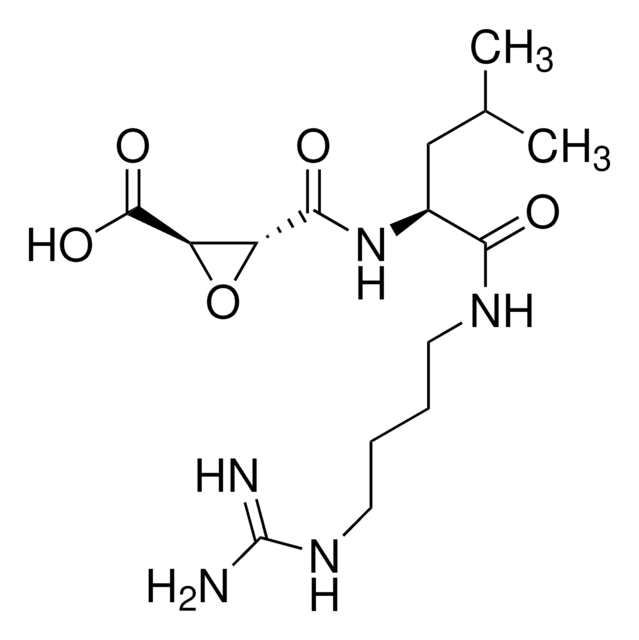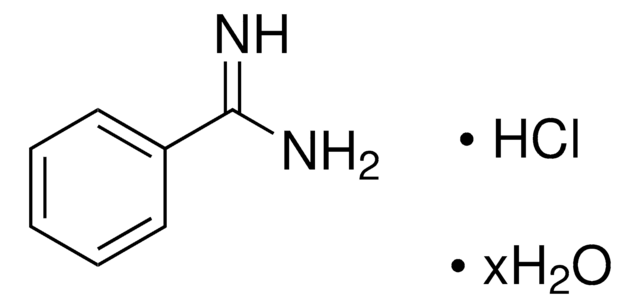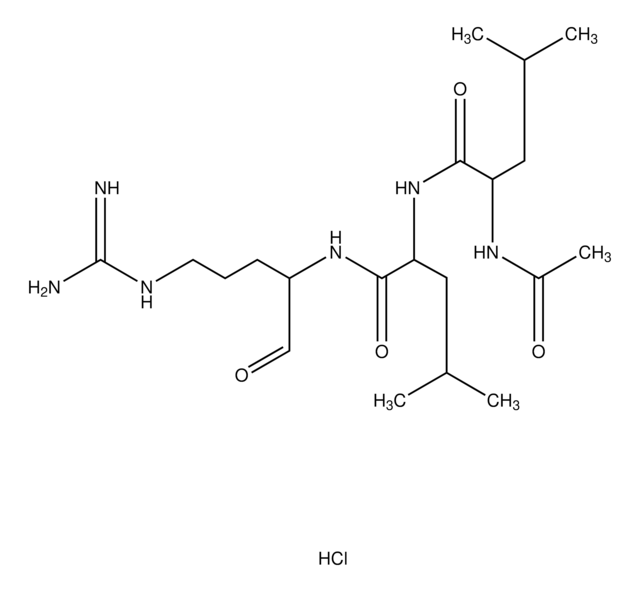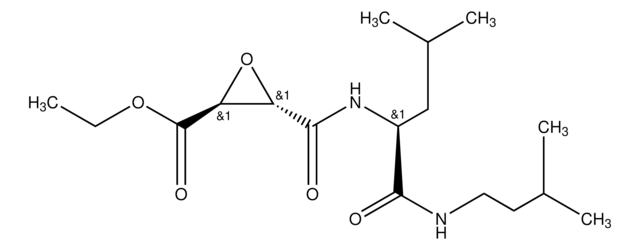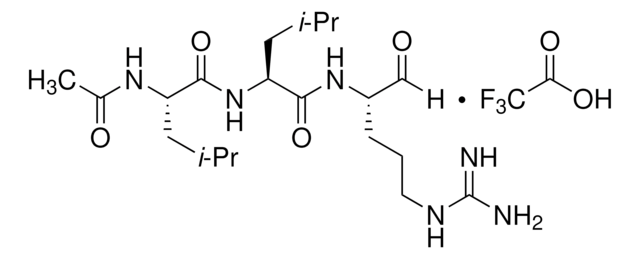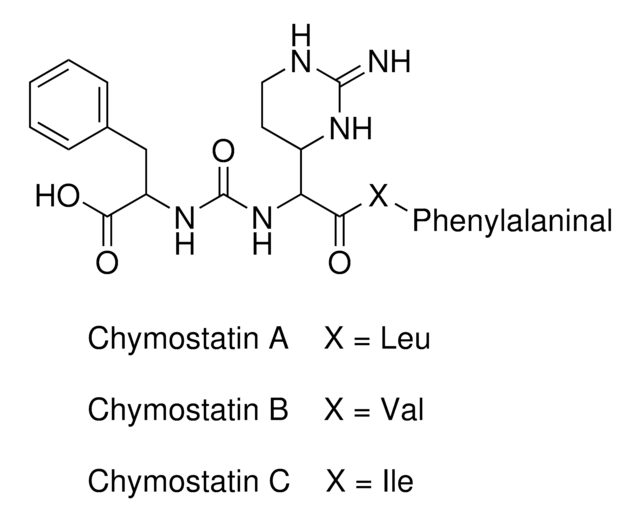EI8
Leupeptin
lyophilized powder, protease inhibitor, Chemicon®
Synonim(y):
N-Acetyl-L-leucyl-L-leucyl-L-argininal, Ac-Leu-Leu-Arg-H, Acetyl-L-leucyl-L-leucylargininal, Leupeptin hemisulfate
Zaloguj sięWyświetlanie cen organizacyjnych i kontraktowych
About This Item
Kod UNSPSC:
51111800
eCl@ss:
32160405
NACRES:
NA.77
Polecane produkty
Nazwa produktu
Leupeptin,
producent / nazwa handlowa
Chemicon®
Poziom jakości
Warunki transportu
dry ice
Opis ogólny
Leupeptin is a water-soluble and cell-permeable organic compound. It is produced by various species of actinomycetes and several other fungal families.
Zastosowanie
Leupeptin has been used as a protease inhibitor supplement in cell lysis buffer for sample preparation.
Działania biochem./fizjol.
Leupeptin serves as a lysosomal protease and calpain (serine- and cysteine-like protease) inhibitor. It may be used to reduce the cell death induced by excess calpain activation. Leupeptin confers significant protection against hair cell damage caused by gentamicin ototoxicity. In addition, it also impedes protein degradation in denervated rat muscles and muscles of mice with hereditary muscular dystrophy. Thus, leupeptin may be beneficial in hindering tissue atrophy.
Postać fizyczna
Lyophilized.
Przechowywanie i stabilność
Maintain dry at -20ºC for up to 18 months after date of receipt. Store reconstituted product in aliquots at -20ºC for up to 6 months. Avoid repeated thaw freeze cycles.
Informacje prawne
CHEMICON is a registered trademark of Merck KGaA, Darmstadt, Germany
Oświadczenie o zrzeczeniu się odpowiedzialności
Unless otherwise stated in our catalog or other company documentation accompanying the product(s), our products are intended for research use only and are not to be used for any other purpose, which includes but is not limited to, unauthorized commercial uses, in vitro diagnostic uses, ex vivo or in vivo therapeutic uses or any type of consumption or application to humans or animals.
Ta strona może zawierać tekst przetłumaczony maszynowo.
Kod klasy składowania
11 - Combustible Solids
Klasa zagrożenia wodnego (WGK)
WGK 3
Temperatura zapłonu (°F)
Not applicable
Temperatura zapłonu (°C)
Not applicable
Certyfikaty analizy (CoA)
Poszukaj Certyfikaty analizy (CoA), wpisując numer partii/serii produktów. Numery serii i partii można znaleźć na etykiecie produktu po słowach „seria” lub „partia”.
Masz już ten produkt?
Dokumenty związane z niedawno zakupionymi produktami zostały zamieszczone w Bibliotece dokumentów.
Klienci oglądali również te produkty
The structure and activity of leupeptins and related analogs.
K Maeda et al.
The Journal of antibiotics, 24(6), 402-404 (1971-06-01)
P Libby et al.
Science (New York, N.Y.), 199(4328), 534-536 (1978-02-03)
The protease inhibitor leupeptin decreases protein degradation in rat skeletal and cardiac muscle incubated in vitro, while protein synthesis remains unaltered. Leupeptin also lowers protein breakdown in denervated rat muscles and affected muscles from mice with hereditary muscular dystrophy. Leupeptin
Erika Billinger et al.
FEBS open bio, 10(12), 2605-2615 (2020-10-06)
Leupeptin is a naturally occurring inhibitor of various proteases, in particular serine proteases. Following its discovery, the inhibitory properties of several other peptidyl argininals have been studied. The specificity of leupeptin is most likely due to the Leu-Leu-Argininal sequence, and
Christian Windpassinger et al.
American journal of human genetics, 101(3), 391-403 (2017-09-09)
In five separate families, we identified nine individuals affected by a previously unidentified syndrome characterized by growth retardation, spine malformation, facial dysmorphisms, and developmental delays. Using homozygosity mapping, array CGH, and exome sequencing, we uncovered bi-allelic loss-of-function CDK10 mutations segregating
Biological activities of leupeptins.
T Aoyagi et al.
The Journal of antibiotics, 22(11), 558-568 (1969-11-01)
Nasz zespół naukowców ma doświadczenie we wszystkich obszarach badań, w tym w naukach przyrodniczych, materiałoznawstwie, syntezie chemicznej, chromatografii, analityce i wielu innych dziedzinach.
Skontaktuj się z zespołem ds. pomocy technicznej

